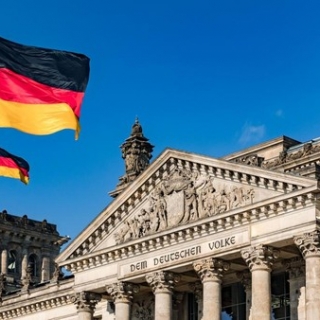


European markets opened lower on Monday as traders reacted to the results of the German federal election.
The pan-European Stoxx 600 was around 0.2% lower shortly after the opening bell, with sectors and major bourses trading mixed. Germany's Dax index was up by around 0.4% during early deals.
Exit polls show the conservative Christian Democratic Union and the allied Christian Social Union secured the largest share of votes in the election on Sunday, with the alliance's candidate Friedrich Merz set to take over from Olaf Scholz as chancellor of Europe's largest economy.
The CDU-CSU won 28.5% of votes, with the far-right AfD in second place with 20% and Scholz's Social Democratic Party coming in third with 16.5%, according to ZDF exit polls data.
The U.K.'s National Grid announced Monday it had agreed to sell its U.S. onshore renewables business to private equity firm Brookfield Asset Management in a deal worth $1.74 billion.
The business being acquired by Brookfield develops, constructs and operates solar, onshore wind and battery storage assets in the United States.
Two-party coalition could boost German defense spending, Deutsche Bank says
The preliminary result of the German federal election points to a two-party coalition, according to Deutsche Bank — an outcome that could bolster the country's defense spending.
After Germans cast their votes on Sunday, preliminary results showed the allied Christian Democratic Union and Christian Social Union (CDU/CSU) parties won the highest proportion of votes, with a combined 28.6%. The far-right AfD came second with 20.8% of the votes, while incumbent Chancellor Olaf Scholz's Social Democratic Party (SPD) came third with 16.4%.
In a note to clients on Monday, economists at German lender Deutsche Bank speculated that a two-party coalition between the CDU/CSU and the SPD is now the most likely outcome, with immigration and defense "the most immediate issues in coalition talks."
"In our view, Europe's challenged security architecture makes it highly likely for CDU/CSU and SPD to agree on higher defense spending in principle … Foreign policy developments over the last fortnight have provided a political pivot for both parties to commit to greater defense spending," the economists wrote.
In recent weeks, the Trump administration in the U.S. has pressured European NATO allies to increase their spending on defense, with NATO Chief Mark Rutte suggesting member states could soon have a target of spending "at least" 3% of GDP on defense. In 2024, Germany spent an estimated 2.12% of GDP on defense, according to NATO data.
"Although a new target may be formulated only after the NATO summit in June, we would assume that defense spending will likely rise to at least 2.5% of GDP over the next term, with a meaningful increase as early as 2026," Deutsche Bank's economists said.
"The tricky question, however, is how to finance this. Any debt brake reform, including for defense spending, would rely on support from one of the fringe parties. This is not impossible, but it would require significant political compromises."
Source: CNBC
Tested EN...
Asian stock markets weakened for the second consecutive day, indicating that the initial rally that had been "speedy" at the start of the year is starting to lose steam. At the same time, US governmen...
US stocks were mixed on Wednesday as investors weighed uneven economic data against expectations for eventual Federal Reserve easing, with the S&P 500 easing 0.2% and the Dow Jones sliding 0.8% fr...
European stocks were in mixed territory on Wednesday morning, as regional market jitters grow over U.S. President Donald Trump's threat to annex Greenland. The pan-European Stoxx 600 was little chang...
Asian stock markets weakened slightly on Wednesday after posting their best start to the year in history. The decline was driven by a decline in Japanese stocks amid escalating tensions with China. Th...
Oil prices stabilized on Thursday (February 12th), as the market reassigned a risk premium to US-Iran tensions despite US inventory data showing swelling domestic supplies. This movement confirms one thing: geopolitical headlines are still more...
Gold prices weakened slightly on Thursday (February 12th), as more solid US employment data reduced market confidence in an imminent Federal Reserve interest rate cut. The strong employment data prompted market participants to shift expectations of...
The Hang Seng Index reversed its downward trend in Hong Kong on Thursday (February 12th), weakening by around 0.9% to around 27,000 after a strong session earlier. This decline halted the momentum of the short term rally, as investors began to...